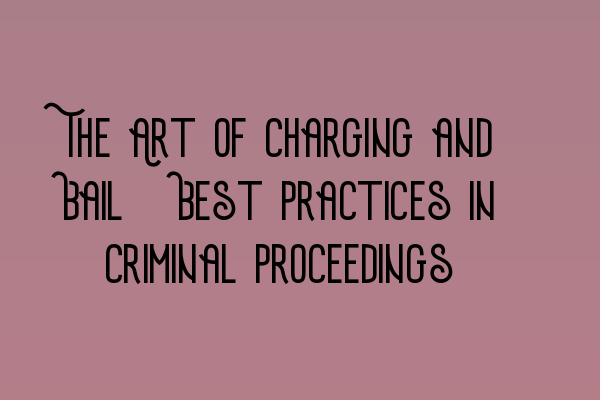The Art of Charging and Bail: Best Practices in Criminal Proceedings
Welcome to the SQE Criminal Law & Practice Law UK blog! In today’s article, we will explore the art of charging and bail in criminal proceedings. Understanding the best practices in these aspects is essential for any solicitor practicing criminal law. So, let’s dive right in!
Charging: The Foundation of Criminal Proceedings
When it comes to criminal proceedings, charging is the foundation on which the entire process is built. It is the formal act of accusing an individual of committing a criminal offense. As a solicitor, it is crucial to understand the key elements involved in charging:
- Evidence: Charging should be based on sufficient evidence that indicates a reasonable suspicion of the individual’s involvement in the alleged offense. It is important to thoroughly review and assess the evidence, ensuring its credibility and admissibility in court.
- Applicable Law: The charging decision should be guided by the relevant laws and regulations pertaining to the alleged offense. Familiarize yourself with the specific legislation and legal principles that apply to your client’s case.
- Charging Document: Prepare a precise and comprehensive charging document that clearly outlines the details of the alleged offense, including the specific charges and any aggravating factors. This document will serve as the initial formal accusation against your client.
For more information on SQE 1 practice exam questions, check out our SQE 1 Practice Exam Questions article.
The Importance of Bail
After an individual has been charged, the next crucial step is determining whether bail should be granted. Bail ensures that defendants can be released from custody while awaiting trial, provided they comply with certain conditions. Here are some best practices to consider:
- Risk Assessment: Conduct a thorough risk assessment to evaluate the likelihood of the defendant fleeing, interfering with witnesses, or committing further offenses if granted bail. This assessment can help inform the decision-making process.
- Conditions of Bail: Propose appropriate conditions of bail that adequately address any concerns about the defendant’s behavior while released. These conditions may include regular reporting to authorities, electronic monitoring, or surrendering passports.
- Bail Application: Prepare a compelling bail application that highlights the defendant’s ties to the community, their past record, and any other relevant factors that support the granting of bail.
To enhance your understanding of bail and its significance in criminal proceedings, we recommend our SQE 1 Practice Mocks FLK1 FLK2 article.
Continuing Professional Development: Stay Up-to-Date
Criminal law is an ever-evolving field, and as a solicitor, it is crucial to stay updated on the latest developments, changes in legislation, and relevant case law. Continued professional development (CPD) plays a vital role in the growth and success of a criminal law practitioner.
To ensure you have access to the most comprehensive and up-to-date CPD courses, we recommend our SQE 2 Preparation Courses and SQE 1 Preparation Courses. These courses are designed to equip you with the essential knowledge and skills required to excel in your criminal law practice.
Stay Informed: SRA SQE Exam Dates
If you are aspiring to become a qualified solicitor, it is crucial to stay informed about the upcoming SRA SQE exam dates. These exams are a mandatory requirement for qualifying as a solicitor in England and Wales. Stay updated with the latest exam dates and registration deadlines to plan your preparations effectively.
For more information on SRA SQE exam dates, please visit our SRA SQE Exam Dates article.
Thank you for reading our blog article on the art of charging and bail in criminal proceedings. For further insights and guidance on criminal law and practice, stay tuned to our blog and explore the articles mentioned above. If you have any questions or require legal assistance, our team of expert solicitors is here to help.
Disclaimer: The information provided in this article is for general informational purposes only and should not be considered legal advice. Always consult with a qualified solicitor for advice tailored to your specific case.
